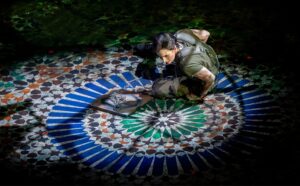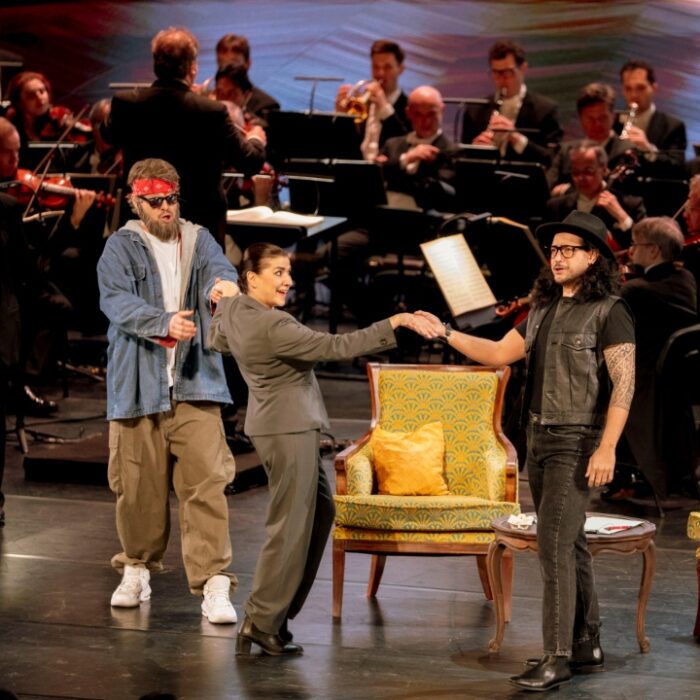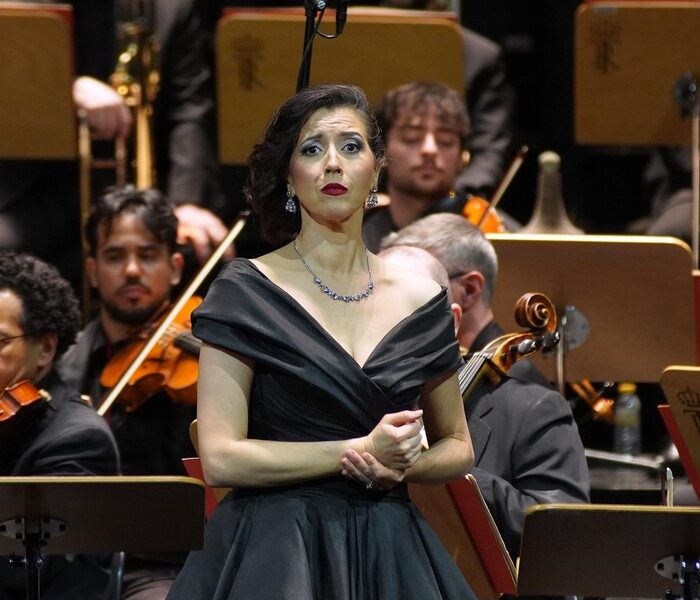
Donizetti Opera Festival 2024 Review: Zoraida di Granata
By Bernardo Gaitan(Photo: Gianfranco Rota)
An early gem by Donizetti is reborn as part of the #donizetti200 project during the Donizetti Opera Festival’s tenth anniversary. This festival reaffirmed its commitment to recovering lesser-known works from the Bergamo composer’s catalogue, presenting this year the second version of “Zoraida di Granata.” Originally premiered in 1822 and revised by Donizetti himself in 1824, this opera marked the young composer’s first major success at the age of just 25. With this work, Donizetti faced the unpredictable nature of the theatrical world, as he had to rewrite the male lead role in record time for a mezzo-soprano. Initially composed for tenor Amerigo Sbigoli, the role was adapted “en travesti” after the singer suffered an aneurysm on stage while performing a Pacini opera.
The libretto, based on a work by Jean-Pierre Claris de Florian, is set in an idealized Granada, evoking the exotic Spain that fascinated Italians of the time. Against a backdrop of political tensions and romantic conflict, Zoraida, the daughter of King Almanzor, deeply loves the nobleman Abenamet. However, their love is threatened by Almuzir, a jealous and violent ruler intent on separating them. The opera, with its classic romantic entanglements complicated by questions of honor, concludes with a happy ending that rewards fidelity and sacrifice.
The music of “Zoraida di Granata” is particularly interesting for its blend of styles. The cabalettas clearly show Rossinian influence, while the conclusions of the arias evoke composers such as Pacini, Cimarosa, and even Mozart in the Italian tradition. Although Donizetti’s mature signature is not yet fully evident, numerous ensemble pieces and cadences hint at the style that would define his later works.
Illuminating Production
This production, staged at the intimate Teatro Sociale in Bergamo Alta, was directed by Bruno Ravella, who took an intelligent and entirely justified modern approach. He set the action in a contemporary location, diverging from the Granada of 1480 prescribed by the libretto. The Moroccan-born director avoided the Orientalist clichés inherent in the text, allowing the characters and music to take center stage.
The set and costumes, designed by Gary McCann, created an intelligent contrast between formality and conflict. The action unfolded in what appeared to be the bombed ruins of the Sarajevo Library, featuring Moorish-style arches topped with the shattered remains of a stained glass window. The soloists wore elegant evening gowns for the women and tailored suits for the men, while the chorus was dressed as soldiers, donning green camouflage uniforms and helmets.
Stunning Cast
The vocal performances of the protagonists were undoubtedly the highlight of this production. Czech soprano Zuzana Marková shone in the title role of Zoraida, delivering a performance full of lyricism and drama. Her agile and powerful voice stood out, particularly in the high register, as showcased in the aria “Rose che un dì spiegaste,” where her sincere emotional delivery deeply connected with the audience. Meanwhile, the role of Abenamet found a remarkable interpreter in Cecilia Molinari, who convincingly conveyed a masculine essence paired with a warm vocal tone. The Italian singer’s expressive timbre added depth to the character, especially in duets with Zoraida. In the poignant final aria “Da un eccesso di tormento,” Molinari skillfully alternated between the character’s bravery and a vulnerability that humanized the lovers’ relationship.
However, it was the male duo that left the audience in awe. Konu Kim as Almuzir delivered a compelling theatrical performance, underpinned by a voice of great power and projection. He impressed particularly in the second act’s intense aria “Amarla tanto e perderla!,” displaying a strong central register and outstanding acting. In the cabaletta “Sì, vendetta di rabia,” the South Korean tenor flaunted resounding, heroic, and perfectly placed high notes, earning thunderous ovations. Valerio Morelli as Alì Zegri was another delightful surprise. The Italian bass, possessing an instrument rich and full of nuance, captivated in the aria “Sì, vi tradì la sorte.” His resonant and well-tuned lower and middle registers, combined with an impeccable vocal line, underscored his interpretative mastery.
The cast was rounded out by solid performances from Spanish tenor Tuty Hernàndez as Almanzor and Lilla Takács as Inés. Alongside Morelli, they are members of the Bottega Donizetti, the festival’s opera studio. The Teatro alla Scala Academy Chorus, under Salvo Sgrò’s direction, excelled throughout, particularly in the final scene, amplifying the drama of the conclusion.
Musical Highlights
From the pit, Alberto Zanardi led the Orchestra Gli Originali in a vibrant and meticulous reading of the score. Using period instruments, which added stylistic authenticity to the work, Zanardi preserved the freshness of this early opera while highlighting innovations that foreshadow Donizetti’s future achievements. His tempi, dynamics, and careful attention to the singers were impeccable, and his direction was particularly striking in the ensemble numbers, achieving a brilliant balance between orchestra and soloists, Rossinian style and classicism.
In the program notes, Zanardi points out that the 1824 version, unlike its 1822 predecessor, features significant improvements in the libretto and music. With nearly an hour of additional material, Donizetti completely rewrote the opera’s ending into a more triumphant and emotional scene. He also began experimenting with orchestration, particularly by giving the bassoon prominent passages—an instrument known to have been the Lombard composer’s favorite.
The integral version of “Zoraida di Granata,” which runs over three and a half hours, is fascinating despite its length and stylistic blend. It reveals the melodic genius and theatrical skill that would make Donizetti one of the great names of bel canto. The final ovation at Bergamo’s Teatro Sociale not only testified to the success of this production but also reaffirmed the festival’s mission: to rescue Donizetti’s forgotten works and demonstrate that they deserve more frequent performances on the world’s opera stages.
Categories
Reviews


